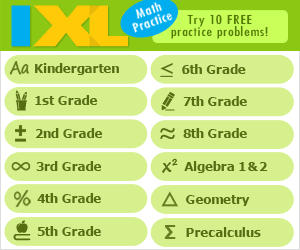4th Grade English Language Arts - Literature Standards
All links in the pages below were verified in October or November, 2011
To work on fourth grade literature standards, click on the numbers below to visit pages of internet resources for each of the learning standards.
Checks for Understanding are at the top of this page. Scroll down to find internet resources related to the State Performance Indicators (SPIs).
Checks for Understanding (Formative/Summative Assessment)
0401.8.1 Pre-Reading Strategies - Use a variety of pre-reading strategies (e.g., organize prior knowledge using a graphic organizer, explore significant words to be encountered, relate text to prior personal and historical experiences and current events). 0401.8.2 Derive Meaning - Derive meaning while reading (e.g., express reactions and personal opinions to a selection, make inferences, draw conclusions based on evidence gained). 0401.8.3 Check for Understanding - Check for understanding after reading (e.g., identify the author's purpose; locate information to support opinions, predictions, and conclusions). 0401.8.4 Build Vocabulary - Build vocabulary by listening to literature, participating in discussions, and reading self-selected and assigned texts. 0401.8.5 Read with Fluency - Read with fluency from a variety of texts (e.g., poetry, drama, current events, novels). 0401.8.6 Varying Forms of Text - Recognize varying forms of text (e.g., poems {lines and stanzas), plays {acts, stage directions}, novels{chapters}. 0401.8.7 Literary Genres - Read, view, and recognize various literary genres (e.g., poetry, novels, short stories, plays, historical fiction, nonfiction). 0401.8.8 Problem and Solution - Determine the problem of a story, discover its solution, and consider alternate solutions. 0401.8.9 Sequence - Sequence the events of a selection from beginning to end, determining how the incidents are connected and lead to a solution/conclusion. 0401.8.10 Identify Characters - Identify and describe main and minor characters, considering the importance of their actions, motives, and appearances. 0401.8.11 Compare and Contrast - Compare and contrast different version/representations of the same stories/events that reflect different cultures. 0401.8.12 First Person - Explore first person point of view. 0401.8.13 Sound Devices - Recognize sound devices in poetry (e.g., alliteration, rhythm, rhyme, repetition, onomatopoeia). 0401.8.14 Theme - Explore the concept of theme. 0401.8.15 Literary Devices - Recognize and interpret basic literary devices (e.g., imagery, simile, metaphor, personification, hyperbole). 0401.8.16 Culture and Literature - Develop an awareness of literature as a reflection of its culture. State Performance Indicators
SPI 0401.8.1 Fairy Tales - Recognize plot features of fairy tales, folk tales, fables, and myths. SPI 0401.8.2 Characters, Setting, and Plot - Identify characters, setting, and plot in a passage. SPI 0401.8.3 Determine Problem - Determine the problem in a story and recognize its solution. SPI 0401.8.4 Make Predictions - Make appropriate predictions about text. SPI 0401.8.5 Forms of Text - Identify the forms of text (e.g., poems, drama, fiction, nonfiction). SPI 0401.8.6 Similes and Metaphors - Identify and interpret similes and metaphors. SPI 0401.8.7 Author's Purpose - Identify the author's purpose (e.g., to entertain, to inform, to persuade, to share feelings). SPI 0401.8.8 Sounds of Language - Recognize the sounds of language (i.e., alliteration, rhyme, and repetition). Review Help Resources to help review Fourth Grade English Language Arts standards
Search Internet4Classrooms

Custom Search






